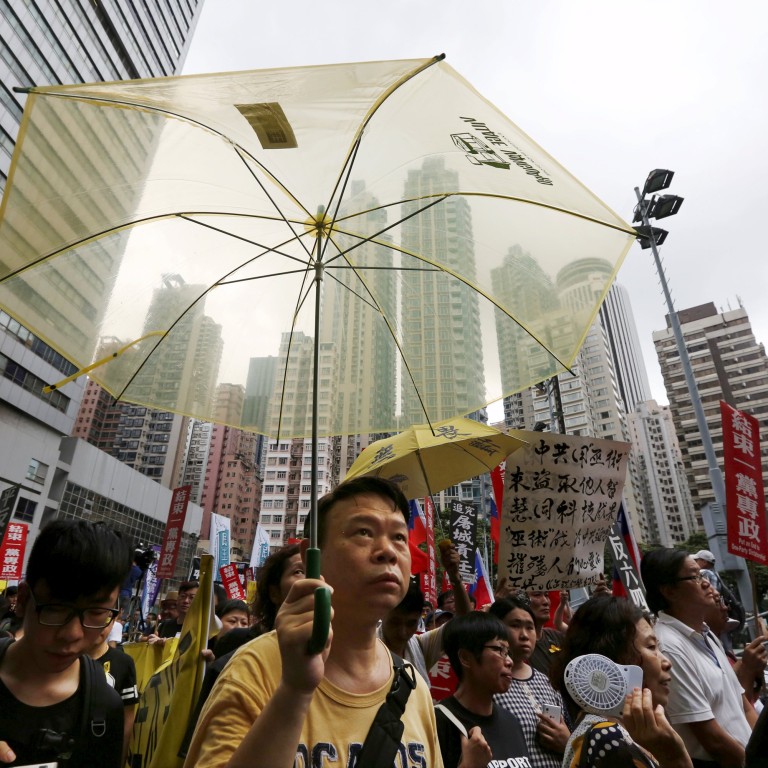
Hong Kong democracy serves to allay public fears over Beijing’s rule
The harassment of the 12-year-old boy who illegally overstayed his visit for 9 years and was hounded out of Hong Kong by radical nativist protestors, was the kind of shocking event any civilized society respecting the rule of law and basic human rights would outlaw. Radical nativism is an embarrassment to advocates and supporters of the democratic cause, and should not be condoned.
In Hong Kong, unlike Western Europe and North America, democracy is not necessary to bring about the rule of law and respect for human rights. These have been in place here since British rule. Rather, democracy in Hong Kong is a means to an end – that of fostering public confidence under Beijing’s rule.
Democracy, if done well, could win over the hearts and minds of the Hong Kong people. The Beijing authorities have periodically pointed out it is them, and not the British, who have promised democracy for Hong Kong.
However, this has not been an easy task to achieve. Indeed, in the process of trying to find a way, our younger generation has increasingly pursued democracy as an end in itself, as a universal system of values desired for its own sake. How did this come about?
First, the events of June Fourth and the attempted enactment of Article 23 undermined confidence in Hong Kong. The Democratic Party and the Civic Party were very much products of these events.
Second, runaway property price inflation in Hong Kong has created a huge divide between the haves and the have-nots and resulted in the growth of political radicalism.
Democracy in Hong Kong now has two purposes. For the moderates, it remains a means to allay public fears of the rule of Beijing. For the radicals, it has become a political goal to create a just society and a better future out of the corrupt present, rather than a means to defend what is good in society.
The rise of radical politics has fuelled fears among the establishment coalition that members of Hong Kong’s democratic opposition are, like populist politicians in Western democracies, enthusiasts for redistributive politics and big debt-ridden governments.
Beijing, as we know, has also long been uneasy about the democratic opposition. In 1999, after increasingly enthusiastic attempts were made by the opposition to gain votes by capitalising on political tragedies on the Mainland and the failures of the Hong Kong government, Beijing introduced proportional representation to limit the dominance of the opposition in the legislature.
This replaced a simple plurality vote, which in 1995 resulted in the opposition capturing 18 out of 20 directly elected seats even though the pro-establishment DAB Party obtained one-quarter of the popular vote.
The hastily designed proportional representation rule, however, became a catalyst for the emergence of radical minority interests as an organised political voice in the legislature. The growth of this political force was no doubt exacerbated by the increasing wealth disparity in Hong Kong due to rising property prices.
The rise of radicalism in the legislature has triggered two developments: more intensive animosity towards Beijing and the growing rift within the pan-democratic camp, which splintered at the 2012 elections after the Democratic Party entered into a dialogue with Beijing leading to important breakthroughs in political reforms.
This growing division and fragmentation has evolved into a non-cooperation movement within the Legislative Council that has escalated without bounds. Even policies attempting to address the growing inequalities in society are not exempted from filibuster actions.
As the economic and social contradictions in Hong Kong society have failed to be addressed, both the establishment coalition and Beijing have become vilified in the eyes of the public. The radicals have successfully precipitated the initial fear of Beijing into animosity towards Beijing. Harassment has become an instrument of hooligans to harness populist support and terrorize the innocent.
The theatrics and tactics employed by the radicals reflect the mistaken belief that political confrontation can solve all problems. It only succeeds in sowing deeper mistrust between Beijing and Hong Kong and makes it more difficult to achieve progress on all issues.
Both Beijing and Hong Kong must appreciate the enormous importance of having a healthy opposition if our city is to thrive economically and socially. The best assurance of an opposition that does not stand in the way of progress is to have the legislature elected by universal suffrage. But Hong Kong also needs a democratically elected Chief Executive by universal suffrage to maintain public confidence in the Basic Law.
Trust needs to be rebuilt urgently.
Richard Wong Yue-chim is Philip Wong Kennedy Wong Professor in Political Economy at the University of Hong Kong

